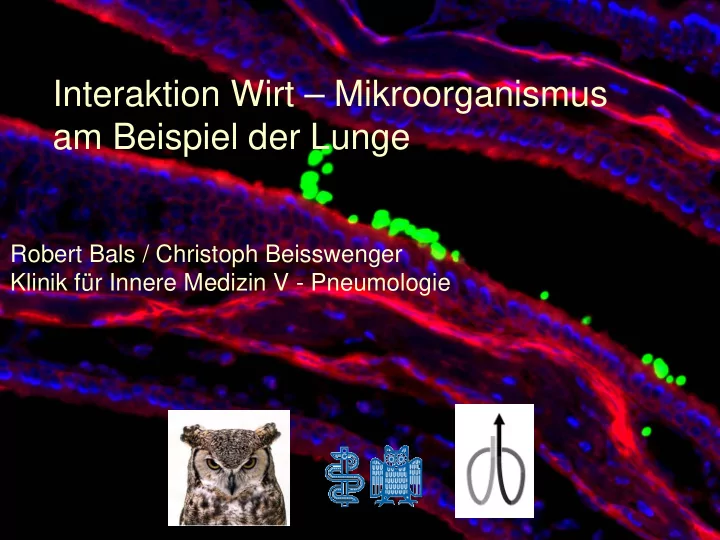

Interaktion Wirt – Mikroorganismus am Beispiel der Lunge Robert Bals / Christoph Beisswenger Klinik für Innere Medizin V - Pneumologie
Analogy
The host needs to control bacterial colonization and infection early time point late time point
The host needs to control bacterial colonization and infection
What is the problem in lung disease? Bacteria Environmental substances Barrier disruption Homeostasis Dendritic cells Lymphocytes Local lymph node
Activation of respiratory epithelial cells by bacterial stressors in vitro hBD-2 hBD-1 IP-10 IL-8 RT-PCR RT-PCR RT-PCR [pg/ml] control 1 1 1 3676 E. Coli 327,4 0,6 59,9 13829 [10 7 CFU/ml] P. aeruginosa 467,8 1,9 34,2 12304 [10 7 CFU/ml] Flagellin 51,9 0,6 3,03 - [50 μ g/ml] PolyI(I:C) 16 0,9 3104,8 13122 [20 μ g/ml] Malp 8,5 1,3 12,9 6048 [1 μ g/ml] IL-1 53,7 1,3 - 8946 [5 ng/ml]
Activation of respiratory epithelial cells by bacterial stressors in vivo p-p38 p-ATF-2 non infected non infected Hi infected Hi infected WT WT TLR4 -/- TLR4 -/- TLR2 -/- TLR2 -/- Fig. 3
TLR dependent activation of the TGF- β signaling pathway in vivo p-smad2/3 Hi infected non infected WT TLR4 -/- TLR2 -/-
Macrophages regulate epithelial effector substances Murine pneumonia with Pseudomonas aeruginosa Knockout of p65 in macrophages (KO) Immunohistochemistry KC Viable bacteria Epithelial KC expression KO WT Hess et al., ERJ 2009
Microorganism are not only bad Airway epithelial cells (primary or cell line) Stimulation with PAMPs Wound healing in vitro ERGF phorsphorylation
Infections as triggers Asthma of exacerbations Hygiene Hypothesis ?
TH2 cytokines inhibit epithelial host defense Airway epithelial cell (air liquid interface) + Pseudomonas aeruginosa Preincubation with Th2 cytokines Antimicrobial activity
Combination of animal models of allergy and infection OVA OVA OVA OVA aero ip ip ip plus infection with Pseudomonas aeruginosa Evaluation •inflammation •histopathology •microbiology
Allergic inflammation inhibits neutrophil influx Infection with P. aeruginosa Allergic airway inflammation (OVA) Differential cell count
Allergic Allergic airway inflammation inhibits pulmonary host defense Infection with P. aeruginosa Allergic airway inflammation (OVA) anti-CRAMP-immunohistochemistry Microbial viability anti-CRAMP PBS / P.a. OVA / P.a. Beisswenger et al., JI 2006
Effect of cigarette smoke on innate host defense ? in vitro model clinical studies
Study of cigarette smoke: smoke inhibits expression of epithelial defensins Differentiated epithelium A Infection with P. aeruginosa p < 0. 00 01 p < 0. 00 01 35 30 hBD-1 Smoke exposure Relative E xpression vs. hBD-2 25 Control (mock exposure) 20 15 10 5 0 Reference CS P.a. CS + P.a. Defensin expression (mRNA)
Smoking suppresses the innate immune system of the lung - in CAP patients CAP patients Smoker Former-smoker Never smokers Defensin protein levels
Summary 1. Epithelial / lung innate immunity is a network 2. The lung is continousely exposed to microbes 3. Epithelial cells have an important role 4. Presence of microbes is important for asthma, COPD
Univers Heidelberg Bals Lab 2004 - 2010 MHH Alexander Dalpke Tobias Welte Rembert Koczulla Christian Herr LMU München Christian Hess Christian Kupatt UCSD Christoph Beißwenger Rudolf Rupec Rich Gallo Thomas Damm Tetyana Zakharkina Marburg TU München Dong Li Harald Renz Roland Schmid Han Gang Michael Lohoff Jan Hellberg Stefan Bauer Email: robert.bals@uks.eu www.uniklinikum-saarland.de/pneumologie SFB/IR22
Robert Bals robert.bals@uks.eu Pneumologie, Allergologie, Beatmungsmedizin Universitätsklinikum des Saarlandes
Recommend
More recommend